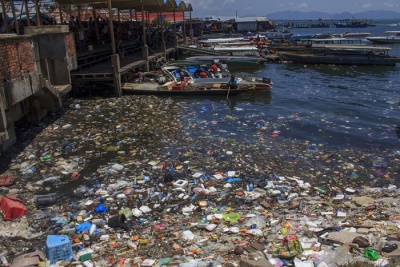ISWA warns of global waste crisis
 The International Solid Waste Association (ISWA) is calling on governments and organisations to broaden their understanding of the global waste crisis following a recent focus on the issue of marine plastics.
The International Solid Waste Association (ISWA) is calling on governments and organisations to broaden their understanding of the global waste crisis following a recent focus on the issue of marine plastics.
The issue of marine plastic pollution has received significant attention recently, with the Ellen MacArthur Foundation Report, ‘The New Plastics Economy’ estimating that there will be more plastics than fish (by weight) in the world’s oceans by 2050, and the documentary A Plastic Ocean investigating the global effects of plastics disposal.
However, ISWA emphasises that marine plastic is just one type of waste seeping into the land, sea and air, often from unregulated sites. With the growth in population far greater than the implementation of waste management systems to service them, the association, an international network of waste management associations, warns that the problem is likely to deteriorate unless coordinated action is taken on a global level.
In a statement released last week (19 February), ISWA expressed its wish to remind governments and organisations that the waste generated by nearly three billion people is not collected into a formal waste management process. Approximately 40 per cent of the world’s total waste is dumped in unregulated ‘open sites’ such as the banks of rivers or stretches of coastline.
While plastic debris is a significant part of the ‘slurry’ that seeps from these sites into waterways, according to ISWA, the toxins, medical debris (including ‘sharps’ such as needles) and liquid residue that permeates through electronic devices are also present in substantial quantities.
This assortment of detritus is circulated by and accumulates in the five major gyres in the world’s oceans; in the North Pacific Gyre, an area of marine debris known as ‘The Great Pacific Garbage Patch’ is thought to contain a third of the world’s oceanic plastic.
However, ISWA adds that there are also major implications for land resources and the atmosphere arising from the lack of waste-site management. The common practice of burning waste releases dangerous pollutants into the atmosphere, and ISWA asserts that polluted leakages can also drain into the soil and have major consequences by entering the food chain.
‘Inexplicable apathy’
Commenting, David Newman, President of ISWA, said: “An inexplicable apathy towards waste management has led to the current crisis, but without immediate action we can expect more to follow.
“The impact of this inaction to human health, the environment and the global economy is well-documented – exposure to the open dumpsites alone has a greater detrimental impact on a population’s life expectancy than malaria.
“Through coordination, the ISWA believes these crises can be averted but the will and motivation from those capable of making change on the ground is essential. That means governments in developed economies must reach out to those who are receiving their waste and support them in establishing sustainable waste management systems, work which the ISWA will willingly provide support.”
Open dumps
In September 2015, ISWA released a report highlighting the ‘global heath emergency’ affecting tens of millions of people in developing countries who lack good sanitation infrastructure.
‘Wasted Health: The tragic case of dumpsite’ illustrated how issues surrounding open dumpsites in developing countries are compounded by unprecedented issues such as the unregulated accumulation of discarded electronics, mobile phones and medical waste.
The report found that roughly 40 per cent of the world’s waste is received by open dumpsites, serving around 3.5-4 billion people. It called for ‘a global alliance’ to take coordinated action to address the global issue of open dumpsites.
The full ‘Wasted health’ report is available on ISWA’s website.






